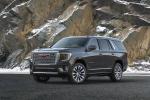GMC
- GMC, a General Motors pickup truck and SUV brand, has rolled out an all-new Yukon for the 2021 model year.
- The new Yukon will be available in GMC's well-known Denali premium configuration, but also in a new AT4 offroad-oriented package.
- GMC now has two distinct sub-brands in Denali and AT4.
- Sign up for Business Insider's transportation newsletter, Shifting Gears, to get more stories like this in your inbox.
- Visit Business Insider's homepage for more stories.
GMC, General Motors' dedicated premium truck and SUV brand, had a very good 2019.
"Combined sales of the Chevrolet Silverado and the GMC Sierra were strong, totaling 802,962 pickups in 2019, while combined retail market share grew almost one full percentage point, according to J.D. Power," GM said in a statement reporting 2019 sales.
In a US market that's seen five straight years of new-vehicle sales over 17 million or above, GMC has benefitted on many fronts. The brand has multiple pickups and SUVs on dealer lots, and it's in the enviable position of posting some of the highest average transaction prices in the industry, hovering around $60,000 per vehicle.
All automakers talk to their customers and craft products to appeal to them, but GMC has developed an especially keen understanding of what its buyers want.
It hasn't been easy. In a world where luxury SUVs have proliferated, with new offerings from Lamborghini and Land Rover, as well as forthcoming models from Ferrari and Aston Martin, GMC serves territory between those famous sports-car names and its corporate sibling, Chevrolet.
"Our buyers aren't looking for a luxury brand," Stu Pierce, GMC's senior marketing manager for trucks and full-size SUVs, told Business Insider. "They want a vehicle that can be used — to pull a trailer or go to the mountains.
GMC buyers are unique in the SUV marketSuch is the unique nature of the GMC owner. In some respects, you could say that many luxury SUV buyers talk the talk, but GMC owners walk the walk.
GMC's lineup of SUVs and pickups offers what's often termed in the industry a "near luxury" experience: a high-quality vehicle with a well-appointed interior that doesn't present an overly aspirational image.
"Self-made people like the GMC brand," Piece said.
For 2020, GMC has a new full-size SUV to satisfy those buyers: the all-new Yukon.
Critically, the Yukon — which shares its underpinnings with the Chevy Tahoe — will continue to be available in the Denail and now AT4 sub-brands.
GMC fans are well-acquainted with the Denali option; it's the highest trim level that the brand sells. It's also quite popular.
"Thirty percent of GMC sales are Denali," Pierce said.
Denali's influence has been so persuasive that Buick has developed its own sub-brand, Avenir. More recently, GMC added a second sub-brand, AT4, designed to appeal to customers who want a premium vehicle that has serious offroad credibility.
Debating where Denali and AT4 fit in"We spent hours debating where the brands stand relatively to each other," Pierce said. "But AT4 is a great play for us."
He added that what GMC customers are after is an SUV with strength and presence. "They want to feel the power of the vehicle."
They also don't fit the stereotype of the suburban weekend warrior, balancing work and family commitments.
"Some of them have kids, but many don't," Pierce said. "Seventy percent of buyers for the shorter wheelbase [versus the longer version that affords more seating capacity) don't have kids at home."
Insights such as that prompted a complete rethink of the Yukon, introduced in the early 1990s.
"We didn't keep anything," Pierce said of the redesign, which for the fifth generation of the SUV focused on improved interiors for Denali, offroad capability for the AT4 option, and versatile new suspension engineering.
"This puts the new Yukon in a really dominant position," Pierce said.
NOW WATCH: What it's like inside Rolls-Royce's $410,000 luxury SUV
See Also:
- How the 26-year-old CEO of tutoring app Scoodle got Twitter co-founder Biz Stone to invest in his startup
- Check out the pitch deck a 26-year-old founder used to get Twitter cofounder Biz Stone to invest in his startup
- Amazon is testing a new shopping feature that shows customer reviews from other countries — but it ignores the big problem with user reviews
FOLLOW US: On Facebook for more car and transportation content!



